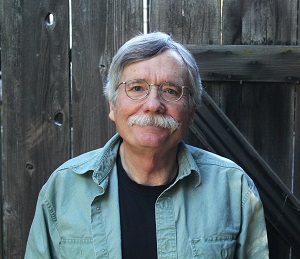
A Machine of Words
Contributor’s Marginalia: Don Bogen responding to John A. Nieves’s “I Built a Goodbye Machine”
Because I was out of town when Issue 41 came out and had proofs of only the pages which included my name and poem, I have to admit I chose John Nieves’ “I Built a Goodbye Machine” for this post sight unseen. I knew only its author and title from my page of the table of contents. But John’s work has never failed to surprise and delight me—and how could I resist the concept of a machine that doesn’t just say goodbye (I can get the message on my phone to do that) but literally takes its leave as it is moving down the page, appearing on its way to disappearance?
In the days before I finally got to read the poem I started thinking about a novelty toy from more than a half century ago: a black plastic box with a toggle switch on top which, when you turned it on, started buzzing and vibrating until a lid would open and a tiny white hand would emerge, turn the switch off, and slowly descend back into the box with the lid closing behind it, at which point the sound and vibration would stop. I’m not sure whether that thing had existential ramifications, but it certainly was Sisyphusian.
And sad. As is John’s poem, though in a considerably more rich and perceptive way. Its seven balanced tercets lead off with what has to be one of the most evocative images of the loneliness of a breakup that’s ever seen print: “a bobby pin soaked in the blue light / of late-night television.” The bleak music of the piece begins with all those ns and ls, reinforced in the second and third lines with lonely, slate, ceiling fan, and my favorite, keyless. And the internal rhyme of “blue light” and “late-night” nails the tone. You can tell from the start that we’re in blues territory. It’s going to be a long haul till dawn.
As you might expect from its bobby-pin beginnings, this goodbye machine is jerry-built, with an inventive list of materials: “two translucent purple dice,” leftover water in the shower, some sage, “a fleck” (perfect word!) “of deodorant,” “the fuzz / from your corner of the bed.” The parts—or should I say ingredients?—become increasingly intimate as the poem subtly picks up speed and the machine turns into a “recipe” with the poet adding a favorite album “sung in its entirety” (well, that can rip your heart out). Then it’s a “pyre.” And what to ignite this conflagration but the most personal contribution of all: a kiss. A blown kiss at that because, after all, a fire needs oxygen.
The goodbye blaze is ready. All the details of a shared life are about to go up in smoke. But in the closing lines of the poem something extraordinary happens to the plot, the pacing, the emotional insight, and the tone. The shortest two sentences—“So I blew this / kiss. Right here.” are followed by the longest one at the very end:
And the last note of night spun
off into new grey day and there was nothing
but how I remembered these things together, how I
spelled your name that last time like a secret only
the shadows could keep as they stretched with the dawn.
I admire the sheer boldness of this closing move. The kiss is “Right here” in the poem, not back “there” in the past. After the increasingly frantic drive to complete his farewell with a machine, a recipe, a pyre, the poet finds a conclusion that is insightful yet still mysterious, lingering, and achingly lyrical. If a poem is a machine of words that must eventually turn itself off, memory has its own ways with time. John’s dark aubade certainly has a grip on my memory. I won’t be saying goodbye to it anytime soon.
